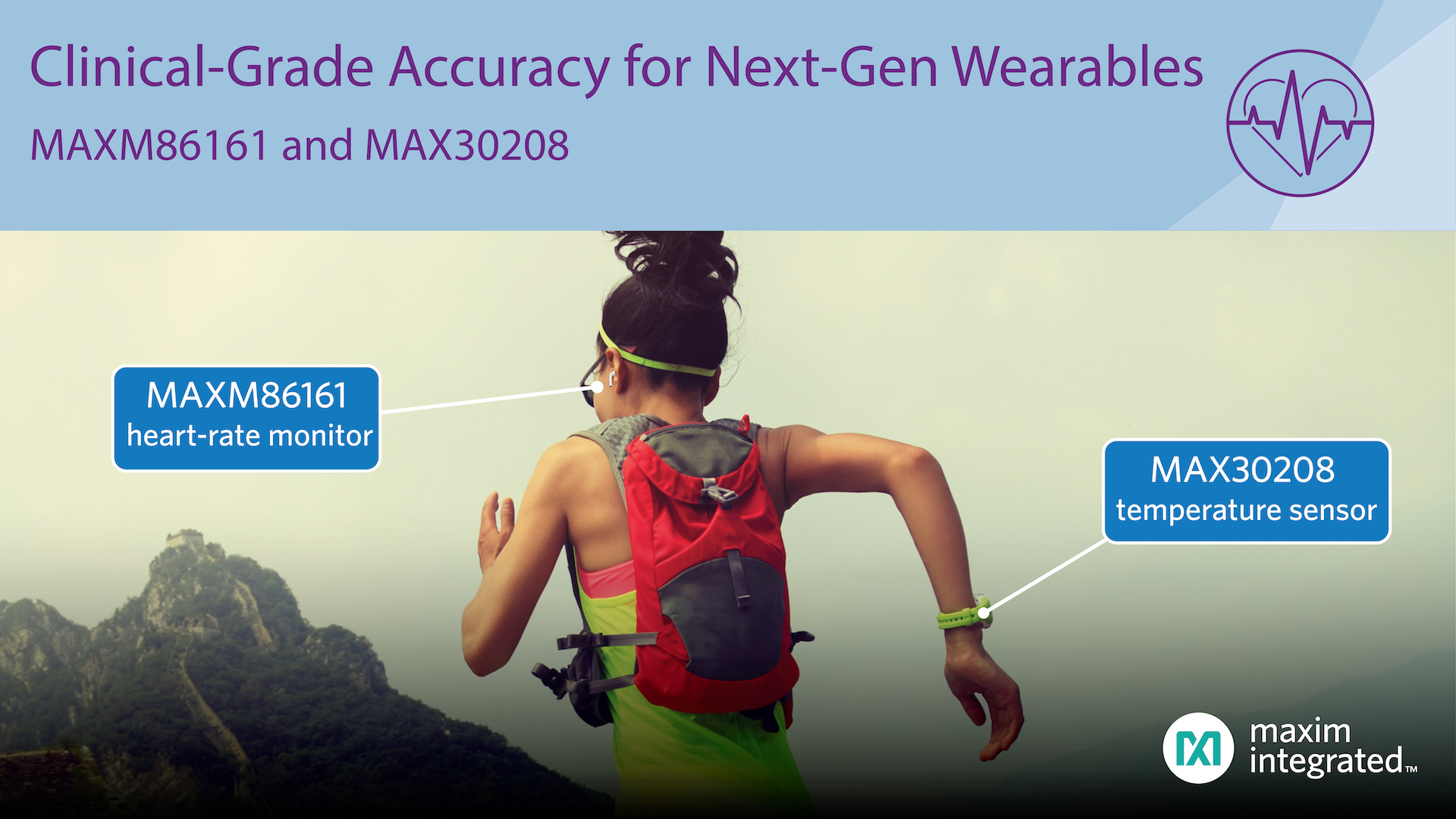Designers creating next-generation wearable health and fitness applications can reduce temperature measurement power by 50 percent with the MAX30208, as well as shrink optical solution size by 40 percent with the MAXM86161 from Maxim Integrated Products, Inc. (NASDAQ: MXIM). In addition, design engineers can improve both sensitivity and accuracy with the highest signal-to-noise ratio (SNR) using the MAXM86161.
To provide value, wearable health and fitness monitors require greater accuracy in measuring human biometrics such as body temperature and heart rate, but device designers have been limited by sensor accuracy for small, battery-powered, body-worn devices. Maxim’s two new continuous-monitoring body sensors provide higher degrees of accuracy in measuring vital signs such as temperature, heart rate and blood-oxygen saturation (SpO2).
The MAXM86161 in-ear heart-rate monitor and pulse oximeter is the market’s smallest fully integrated solution that delivers highly accurate heart-rate and SpO2 measurements from hearables and other wearable applications. It is optimized for in-ear applications with its industry-leading small package size (40 percent less than the closest competitor) and best-in-class SNR (3dB improvement with band limiting signal for PPG use cases compared to closest competitor). This enables development of devices that cover a wider range of use cases. MAXM86161 delivers approximately 35 percent lower power to extend battery life of wearables. In addition, an integrated analog front-end (AFE) eliminates the additional AFE typically needed to procure a separate chip and connect to the optical module.
The MAX30208 digital temperature sensor delivers clinical-grade temperature measurement accuracy (±0.1°C) with fast response time to changes in temperature. It also meets the power and size demands of small, battery-powered applications such as smartwatches and medical patches. It simplifies the design of battery-powered, temperature-sensing wearable healthcare applications. Easier to use than competitive offerings, it measures temperature at the top of the device and does not suffer from thermal self-heating like competitive solutions. MAX30208 is compatible with up to four I2C addresses to enable multiple sensors on the same IC bus. The MAX30208 can be attached to either a PCB or a flex printed circuit (FPC).
Key Advantages
- High Accuracy: MAX30208 delivers ±0.1°C accuracy in the range of 30°C to 50°C and eliminates thermal self-heating, a factor that affects measurement accuracy in competitive devices. MAXM86161 cancels ambient light for greater accuracy and provides highest SNR (Nyquist SNR is 89dB; 100dB SNR with averaging). In addition, Maxim provides algorithms for motion compensation to increase measurement accuracy.
- Lowest Power: To extend battery life of wearables, the MAXM86161 consumes approximately 35 percent lower power versus the closest competitor, with less than 10µA operating power (typical at 25sps) and 1.6µA in shutdown mode. Compared to the closest competitive solution, the MAX30208 consumes only half the power (67µA operating current during active conversion vs. 135µA) under a representative use case.
- Ultra-Small Size: MAXM86161 is available in an OLGA package (2.9mm x 4.3mm x 1.4 mm), which is 40 percent smaller than the closest competitor. MAXM86161 includes three LEDs—red and infrared for SpO2 measurement and green for heart rate; MAX30208 is available in a 10-pin thin LGA package (2mm x 2mm x 0.75mm).
Commentary
“Wearable devices continue to gain market traction, with global revenue now estimated to grow from $56.4 billion in 2019 to $78.3 billion by 2022 at a 4-year compound annual growth rate (CAGR) of 13 percent,” said James Hayward, principal analyst at IDTechEx Research. “Major growth drivers include additional value captured in the growth and evolution of products such as smartwatches and ear-worn products, alongside the adoption of dedicated wearable devices in key healthcare verticals.”
Availability and Pricing
- The MAXM86161 is available at Maxim’s website for $4.41 (1000-up, FOB USA); also available from authorized distributors; The MAXM86161EVSYS# evaluation kit is available for $150
- The MAX30208 is available at Maxim’s website for $1.25 (1000-up, FOB USA); also available from authorized distributors; The MAX30208EVSYS# evaluation kit is available for $56















